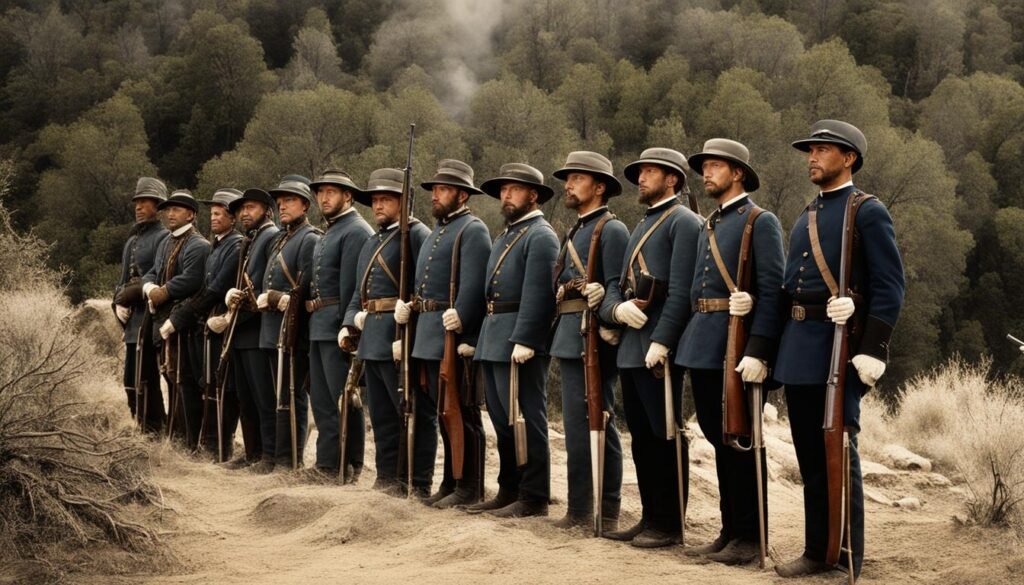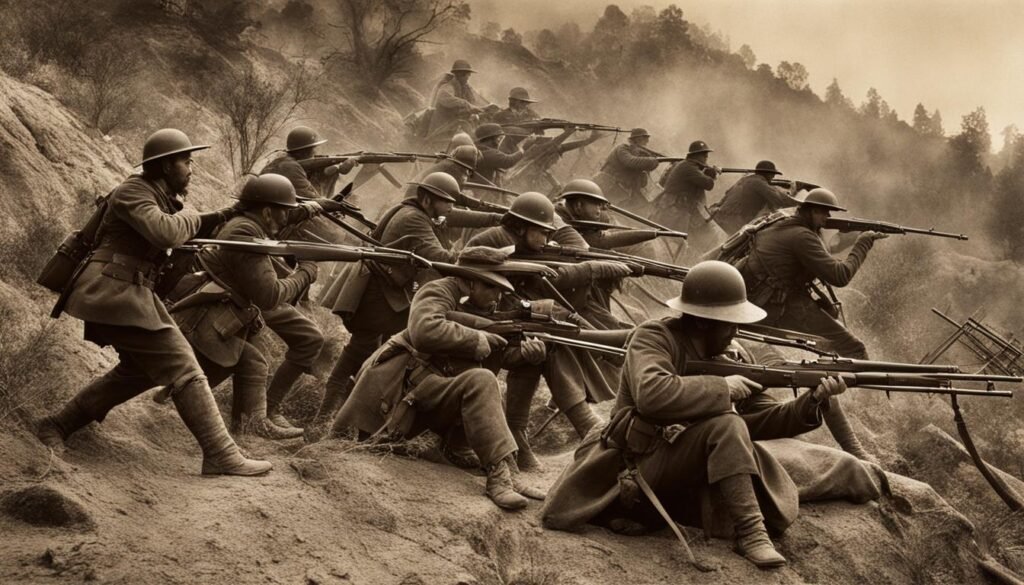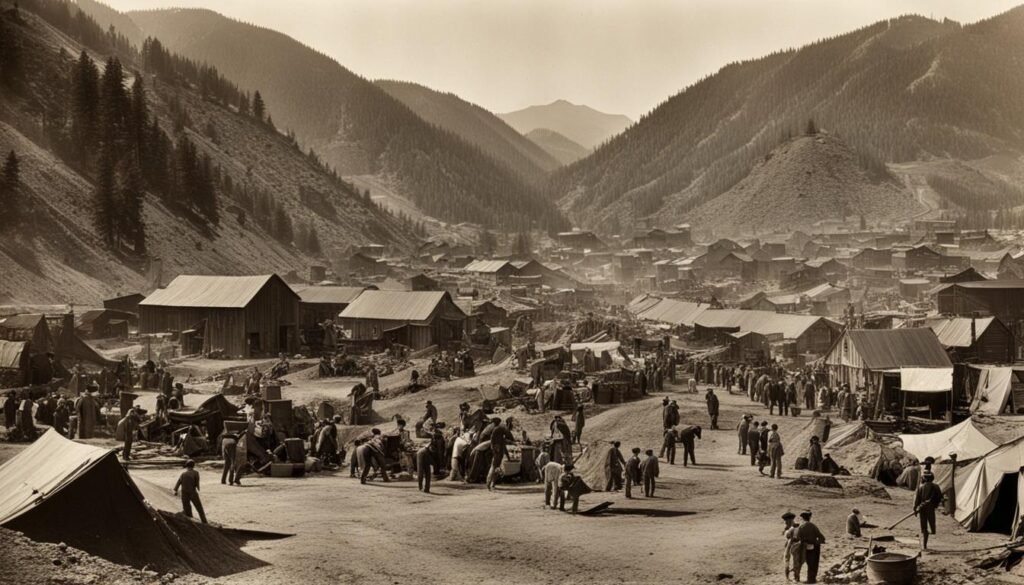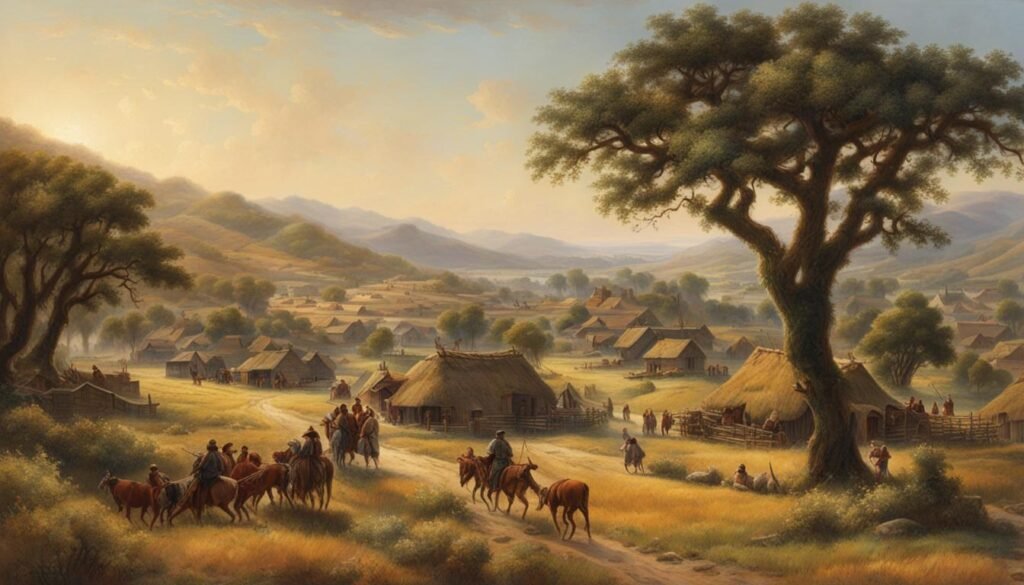Greetings! In this article, I’ll delve into the fascinating story of California’s involvement in the American Civil War. Often overshadowed by the epic battles in the eastern states, California had its own unique role to play in this pivotal period of American history.
While California didn’t witness any major battles on its soil, its impact on the outcome of the war was far-reaching. The state’s gold reserves from the Sierra Nevada Mountains provided vital financial support to the Union government. Additionally, Californians joined the Union Army, with one particular regiment earning the nickname “California Regiment.”
Key Takeaways:
- California played a significant role in the American Civil War, providing financial support and soldiers to the Union Army.
- Despite not experiencing major battles, California’s involvement had lasting impacts on the state’s history.
- The state’s gold reserves were crucial in funding the Union war effort.
- Californians joined the Union Army, contributing to its strength in the eastern theaters of the war.
- California’s unique position and diverse population shaped its role in the Civil War.
Now, let’s dive deeper into the unique position of California during the Civil War and the contributions it made. Stay tuned!
California’s Unique Position in the Civil War
California’s role in the Civil War was shaped by its unique geographical location and diverse population. The state’s history of the Gold Rush attracted people from both the North and the South, influencing its involvement in the conflict. When California became a state in 1850, it quickly established military posts and fortifications in strategic locations like Fort Point and Alcatraz to safeguard its valuable harbor. The population of California consisted of free-soilers from the North, transplanted Southerners, free African Americans, and slave owners, leading to heated debates and tensions over the issue of slavery in the state.
California’s Contributions to the Union Effort
While California did not witness any major battles, it played a pivotal role in supporting the Union effort during the Civil War. The state’s contributions were multifaceted and significant, leaving a lasting impact on its history.
First and foremost, California’s abundant gold reserves played a crucial role in financing the Union war effort. The gold extracted from the Sierra Nevada mountains provided much-needed funds to the Union government, helping to sustain the war and support the troops.
Furthermore, California played a vital role in fortifying the West Coast and protecting its harbors. With the potential threat of Confederate raiders and even British involvement, California established strategically positioned military installations to safeguard its coastal areas. Fort Point and Alcatraz are notable examples of such fortified locations.
In addition to financial contributions and fortifications, California had a strong pro-Union population. Many residents of California joined volunteer regiments and actively participated in the war effort. Large rallies and demonstrations in support of the Union cause were held throughout the state, showcasing Californians’ unwavering commitment to preserving the Union.
The aftermath of the Civil War in California was marked by both the impact of the conflict and the issues of slavery and emancipation. The state grappled with the consequences and sought to address the challenges posed by the transformative nature of the war. It was a period of reflection and adjustment as California navigated its place in the aftermath of the Civil War.
The image above showcases one of the many civil war monuments in California, serving as a reminder of the state’s contributions to the Union effort and its historical significance.
Confederate Presence and Secession Movements in California
While California had a pro-Union majority, there was a vocal secessionist faction in Southern California. Southern California, influenced by the influx of Southerners during the Gold Rush, desired to secede from the Union and join the Confederacy. However, the secessionist movement did not gain enough momentum to make California a Confederate state, and the majority of the state remained loyal to the Union.
In Southern California, there were pro-Confederate groups such as the Los Angeles Mounted Rifles and the Knights of the Golden Circle. These groups actively advocated for secession and sought to establish Confederate support in the region. Despite their efforts, they were unable to sway the overall sentiment of the state.
The constancy of California’s commitment to the Union can be attributed to several factors. The state’s strong ties to the Union were influenced by its diverse population and economic interests. Additionally, the strategic location of California and its vital harbors made it an important Union outpost on the West Coast.
The Confederate presence and secession movements in California highlight the complex dynamics of loyalty and division during the Civil War. While there were pockets of support for the Confederacy in California, the overall unity and dedication to the Union prevailed, solidifying California’s role as a staunch supporter of the Union cause.
Notable Figures and Military Presence in California
During the Civil War, California boasted several noteworthy individuals and a significant military presence. One such figure was William Sherman, a military officer who was stationed in California prior to the war, and later played a crucial role in the Union Army. Another prominent officer was Joseph Hooker, also stationed in California before the war, who went on to serve in various high-ranking positions within the Union Army.
The California Brigade, comprised of different California infantry regiments, made valuable contributions to the Union effort in the Eastern theater of the war. These regiments bravely fought in battles such as Antietam, Gettysburg, and Vicksburg, showcasing the strength and resilience of the California troops.
Moreover, the California 100, a group of cavalrymen from California, joined forces with the 2nd Massachusetts Cavalry and participated in the Shenandoah Valley campaign. Despite being geographically distant from the major battlegrounds, California’s military presence in the Union Army was significant.

Civil War Sites and Monuments in California
While no major battles were fought in California, the state is home to several Civil War sites and monuments. These include forts, camps, and prisons used by the Union Army and pro-Union militias. One notable site is the Drum Barracks in Southern California, which served as the Union Army’s headquarters for the region. Another well-known site is Alcatraz, which served as a prison for captured Confederates during the war. These sites provide a glimpse into California’s role in the Civil War and its impact on the state’s history.
The Lasting Impact and Legacy of the Civil War in California
The Civil War had a significant and lasting impact on the history of California. The state’s involvement in the war helped shape its political and social landscape, leaving a profound impact on its identity and understanding of its place in American history.
One of the key issues that emerged during the Civil War was the question of slavery. California, with its diverse population, witnessed fierce debates surrounding the institution of slavery, secession, and loyalty to the Union.
After the war, California had to grapple with the aftermath and effects of the conflict. The process of reconstruction and the pursuit of civil rights became important issues for the state to address and navigate.
The legacy of the Civil War continues to resonate in California today. The significance of the war in shaping the state’s history and its understanding of its past cannot be overstated. The conflicts and debates surrounding the Civil War in California have contributed to the state’s unique identity and historical narrative.

California’s Civil War history serves as a reminder of the state’s role in this transformative period. It sheds light on the complexities and challenges faced by the people of California during this time. The Civil War’s legacy in California is an integral part of the state’s ongoing narrative, reminding us of the significance and lasting impact of this pivotal moment in American history.
Conclusion
The Civil War in California had a profound impact on the state’s history and played a unique role in the overall war effort. While California did not witness any major battles, its contributions to the Union cause were significant.
California’s financial support played a crucial role in funding the Union government, thanks to the gold reserves from the Sierra Nevada mountains. The state’s strategic location led to the establishment of military posts and fortifications to protect its harbors. California’s diverse population, consisting of people from both the North and the South, shaped the debates and tensions surrounding slavery.
Although there was a secessionist faction in Southern California, the majority of the state remained loyal to the Union. Notable figures such as William Sherman and Joseph Hooker had ties to California before the war, and Californians joined Union regiments to fight on the Eastern front. Today, California’s Civil War sites and monuments serve as reminders of this transformative period in the state’s history.
The lasting legacy of the Civil War in California is seen in the state’s understanding of its role in American history. The conflict helped shape California’s political and social landscape, with issues of slavery and secession leaving a lasting impact. California’s involvement in the Civil War, although unique and not widely known, is an important part of the state’s historical narrative.
FAQ
What role did California play in the Civil War?
California played a significant role in the Civil War by providing strategy, logistics, and political support to the Union. Its gold reserves helped fund the Union government, and many Californians joined the Union Army.
Was California a Confederate state during the Civil War?
No, California remained loyal to the Union during the Civil War. While there was a secessionist faction in Southern California, the majority of the state supported the Union cause.
Did California witness any major battles during the Civil War?
No, California did not see any major battles during the Civil War. However, it played a crucial role in fortifying the West Coast and protecting its harbors from Confederate raiders.
Who were some notable figures from California during the Civil War?
Military officers like William Sherman and Joseph Hooker were stationed in California before the war and played important roles in the Union Army. The California Brigade and California 100 also made significant contributions to the Union effort.
Are there any Civil War sites or monuments in California?
Yes, California is home to several Civil War sites and monuments. These include forts, camps, and prisons used by the Union Army and pro-Union militias. Notable sites include Drum Barracks and Alcatraz.
What was the lasting impact of the Civil War in California?
The Civil War had a lasting impact on California, shaping its political and social landscape. It sparked debates and tensions regarding slavery and secession and influenced California’s understanding of its place in American history.
What was California’s unique position in the Civil War?
California’s unique position in the Civil War was shaped by its geographical location and diverse population. The state’s gold reserves, military presence, and pro-Union majority distinguished its role in the war effort.
How did California contribute to the Union effort during the Civil War?
California provided financial support through its gold reserves and played a role in fortifying the West Coast. Many Californians joined the Union Army, and the state had a pro-Union population that held large rallies in support of the Union.







